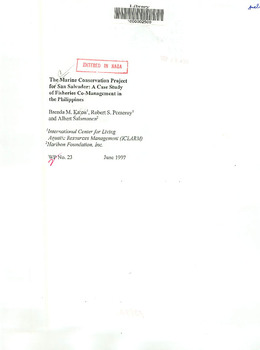The Marine Conservation Project for San Salvador: a case study of fisheries co-management in the Philippines
Abstract
San Salvador, an island village of Masinloc municipality in Zambales, Philippines, has been inhabited by approximately three generations of residents. The initial migrants, who were largely farmers from the mainland of Zambales province, did not have a clear tradition of fisheries management and an indigenous expertise on fish stock management. Until the late 1960s, village residents recalled an abundance of coastal resources and a lack of resource use conflicts, which enabled fishers to enjoy an open and unrestricted access to the fishery. The Marine Conservation Project for San Salvador, which was implemented from 1989 to 1993 by a non-government organization, known as the Haribon Foundation, highlights how the fisher community and the local government jointly regenerated fishery resources through coral reef management. The redefinition of property rights and rules in 1989, along with vigorous law enforcement activities, complemented resource management efforts. The San Salvador experience attests to how a community can rise above the obstacles associated with de facto open access nature of fisheries. It offers hope to many small island communities in a similar situation with an unwavering resolve to avert resource deterioration

